 I had a conversation last March with a young friend. Yes, it has taken me over a year to figure out how to share our conversation. The topic is challenging, and I am busy caregiving. This last comment leads us into my conversation with my friend.
I had a conversation last March with a young friend. Yes, it has taken me over a year to figure out how to share our conversation. The topic is challenging, and I am busy caregiving. This last comment leads us into my conversation with my friend.
She was overwhelmed and felt like a parenting and personal failure. She wanted to know how to identify the essentials and have some control. : ) I could relate to everything she was feeling and suffering. Frankly, I was in the same boat but for different reasons. She was asking me something I was just beginning to get a handle on myself. That is probably why over a year passed before I could share the conversation.
Let me fill you in on our situations. My friend has a baby, a toddler, and a child in preschool. They were living in a multi-family situation and preparing to move. She was also dealing with the trauma of a miscarriage. Her basket was overflowing.
Six years ago, after a year of putting it off, I left my speaking and teaching business and became a full-time caregiver to my mother, who is 94 and has dementia. My husband is also unwell and needs help. On the side, I assist in the care of my 18-year-old granddaughter, who has severe CP. I feel as if I am standing in my young friends’ shoes, in a way.
I have wonderful women in my life in all stages of parenting. Some have small children like the friend I had this conversation with, others have teens, and some, like me, are grandmothers. We talk informally about managing the craziness life can throw at you, how to be better people, and how to care for ourselves while still taking care of the important things. We also grapple with what are the most important things and how to keep them on the top of the list. None of these are easy subjects. It helps to bounce ideas off those you trust. Hence, my young friend and my conversation. I will call her B.
B. wondered how to prioritize. How to do what is needed before her energy runs out. Her productivity lessens as she moves through the day. She wondered about systems to help her get the kid things done, the household things done, get her writing done, and find space for rest. Yes, she is a writer too. : ) See, I am sorta in her shoes. LOL
When I responded to her video this is what happened. I made a 20-minute response only to discover that I hadn’t been recording. I redid the whole thing and began, “I just made a 20-minute video, and the recording wasn’t on. That’s how my days go. That’s how yours are going. I can relate to where you are because that’s where I’m at.”
Each stage of life has its challenges. After 74 years and trying many things I have learned that you need to allow where you are to be OK until you can move to a new place. And you will move to a new place because life isn’t static. If it’s hard now, there will be a time of relief, and then it may be hard again and the cycle repeats. So, what is vital, in my opinion and experience, is to have some tools for managing what is.
Here are some tools that I use, and shared with B.
1. Recognise and manage your story – I know I have written about this often, but it is the number one thing I look at whenever life is hard, sad, confusing, or am angry or weary, in conflict with someone, or my day is going south. What I tell myself about what is happening matters!
My first suggestion to my friend was that she had to get a handle on her story. This is what it was – I am failing. I can’t get stuff done. Other mothers manage better than I do.
As I said, I am standing in her shoes in a way. Here is the story I have been dealing with for seven years – I must get as much done as possible before 3 pm or the day shreds apart and I don’t get to my stuff.
When I feel the day getting out of control, I remind myself this is a story. I want you to know that this year I have begun to get a handle on this story and my days have had a better flow despite challenges, interruptions, or not getting it all done before late afternoon. Getting control of a story can take time. You must keep working on it. Old stories do resurface, especially when we are overly tired. If a story returns it isn’t because you haven’t done the work. It’s because that happens, and you are wise if you keep practicing story management without beating yourself up!
When you are overwhelmed STOP and ask yourself, “What is the story I am telling myself right now?” Then work on story management.
2. Make a plan and promise to do your best. I do this through prayer. When B. and I had this video conversation I was taking a class on emotional resilience because I like learning new things and improving my skills.
In one of the classes, they talked about time, and I felt the triggers going off. Remember my time story? They showed a video of a woman in Africa. She was sharing with a young man how she managed time. I wrote what she said down. This notebook sits on my table where I eat, and I see it every day. Watch the video HERE.
I use this notebook when I say my morning prayer and night prayer. My prayers are short because I often need to help Maggie or another family member. During one morning prayer, I had to stop and let the cat out. Then I had to stop to get the dog to cease barking, and I had to answer the door for one of the kids. Prayers are not always peaceful, and I know that God understands the life of women. That is why what the African woman shared was so valuable.
Each morning she prayed:
- I promise to do my best.
- I ask for help with all that I cannot do.
- Where and whom do I serve today?
- I ask for help in ordering my daily task list.
- Then I listen (and I would add, for what time I am allowed before the next interruption LOL).
I have added this to what she taught the young man:
- Then I go to my list, read it over, add what comes to mind, occasionally take something off that is no longer important for that day, and then number my tasks.
This simple system has made a huge difference in the flow of my day and how I feel at the end of the day. If I only got one thing done, but I did my best as I served and dealt with the interruptions, then I am OK.
If prayer is not your thing, then take time to ponder. Think about what would be best. Ask yourself the questions and then review your daily task list. Make needed changes, and then determine the order to do your tasks.
3. Have simple systems. My morning prayer routine is a system. I know it doesn’t seem like prayer can be a system, but for me and the African woman, it is. It is what helps us manage our busy lives.
In a recent article, I shared my daily worksheet. It isn’t for everyone, but it works for me and was compiled over seven years of experimenting with different systems. It is simple. It helps me remember and gives me a way to order what matters most. I can’t possibly get everything done but when I find myself drifting or off-center, I have a system that helps me return.
My friend B. needed help getting herself ready in the morning. Her baby is often up at 6:30. I asked what was essential for her to feel put together and she replied, “Wash my face, brush my teeth, get dressed, pull back my hair, and put on mascara. I suggested she put her brush and mascara in an easy-to-access place in her bathroom, not with all her other makeup. I also suggested that she hang her clothes for the next day on the bathroom door. I have found this essential to get myself together in the mornings.
It helps because I can dash into the bathroom, run the brush through my hair, throw on my clothes, brush my teeth, and run to whatever is next. This simple system of having my clothes on the bathroom door and a brush on the shelf has saved me more than once, and I can go into the day reasonably prepared.
Now when the baby wakes at 6:30 B. can nurse him. Then B. takes him and herself to the bathroom where her clothes are hanging, and her brush and mascara are handy.
Prayer and simple systems, used with consistency help me stay out of that dark place of feeling like a failure and they will help B. also. We don’t need to feel like crap because we will have done our best, God will make up the difference, we will be reasonably presentable for the day, and there will be another day to do the rest.
4. Make Space for what you need – B. was dealing with moving, trauma, and three small children. I am constantly taking care of other’s needs. We are each in a season and it is what it is. There are physical and emotional consequences to each season. We must learn to accept our season and manage the consequences until we move to a new season.
B.’s kids will grow, and her trauma will lessen. But a season of older children will also have consequences on her physical, mental, and emotional self. My mom will eventually pass away, and I may not always have Don and Maggie to care for. Those changes will have consequences that I will need to manage. It will be a new season.
B. felt bad because when her son went to preschool and the baby went down for a nap, she wanted a nap. She thought she should buck up and get stuff done. As we talked, she could see that at this season it would be OK to take a short nap. It is what her body and mind need.
I don’t nap but sometimes I must leave. I take a short walk or go on an errand alone. My mom loves to go in the car, and I usually take her but sometimes I need to be alone and sometimes B. needs a nap. We need to let ourselves have what we need now and then because when we make space for ourselves, we parent, and care give better.
B. worried because she couldn’t get her exercise in. She couldn’t go for walks or make it to the gym. I shared that sometimes we need a different system. Here is an article about how my daughter got exercise with three small children, one with Cerebral Palsy. Going to the gym wasn’t in the cards or walking alone. Her third option was brilliant and would work for B.
I used to sit for hours and read. It is my favorite pastime. But caregiving three adults doesn’t leave me hours to read. I had to find a new way to satisfy this need. Here is an article that shows how I let my bathroom conquer the reading time shortage problem. Do what you can and let it count, even if it is sitting in the sun for 5 minutes!
5. Take responsibility – I am a writer. I do it because it brings me joy, but it is a challenge to get it done. I allow many things to get in the way. Did you notice that I said, “I allow…
One week I didn’t make giving myself time to write a priority. I left the whole thing until Saturday. I try not to write or have any appointments on Saturday. It is my day. That doesn’t mean I don’t cook, clean, and care for other’s needs, but I want the day to be flexible. It feels almost like a rest no matter how busy it is if the day is flexible.
But I had left the whole thing till Saturday morning. Writing an article, rewriting it several times, editing it, formatting it on the website, and creating and formatting the newsletter can take 4 to 6 hours or more. Can you see the problem? I hadn’t followed my simple system for finishing by Friday evening and I found myself in trouble. Systems require consistency!
I got upset with Don several times that day because I was still caregiving, making meals, etc. I was grouchy and my tone was not generous. I finally had to look at my way of being and take charge of my story. No one was making me write. I could choose not to post an article on Sunday. No one had kept me from doing a little each day. I had made choices that left it till the last minute.
I went to Don and confessed that I had been treating him poorly. I told him I wasn’t mad at him; I was angry at myself because I hadn’t followed my system. Don felt better and believe me, I felt better. Then I had to have the same conversation with my mother. Then I finished my writing, hit schedule, and breathed a sigh of relief.
Part of B.’s struggle was that she didn’t have systems in place, and she didn’t always have a plan for her day. She wasn’t allowing what she could do for herself, in the time available, to count. Consequently, she felt upset with her husband, the kids, and life. As we conversed, she could see the value of taking responsibility. When I say responsibility, I do not mean to beat ourselves up. I mean to correct your story, get simple systems in place, use them consistently, and make a plan. Then follow the plan the best you can. Do your best and let God take care of the rest.
I am learning. Imagine at 74 I am in B.’s shoes, in a way. I have more experience and knowledge than she does but I can still drift off the path and blame others. The difference is I know and can correct. Now B. is practicing the same. We are 100% in control of our response. When we know this truth we can take responsibility for our part, and it is liberating!
My personal belief is that God has great respect for his daughters. He knows my burdens and he knows yours. He can and will help us as we implement simple systems, use them consistently, plan ahead, give ourselves space to care for our needs, manage our stories, and take responsibility.



 I have the privilege of having a granddaughter with severe cerebral palsy. Whenever anyone finds out they always respond with, “Oh, I am so sorry.” They don’t need to be sorry. Maggie is one of the happiest human beings I know. Her mother loves her and magnificently cares for her. I have the privilege of living in a four-generation home and I see what having a special needs child can entail. There is no getting around how challenging it is, but there is also no getting around how rewarding it can be, how you are changed and privileged to grow.
I have the privilege of having a granddaughter with severe cerebral palsy. Whenever anyone finds out they always respond with, “Oh, I am so sorry.” They don’t need to be sorry. Maggie is one of the happiest human beings I know. Her mother loves her and magnificently cares for her. I have the privilege of living in a four-generation home and I see what having a special needs child can entail. There is no getting around how challenging it is, but there is also no getting around how rewarding it can be, how you are changed and privileged to grow.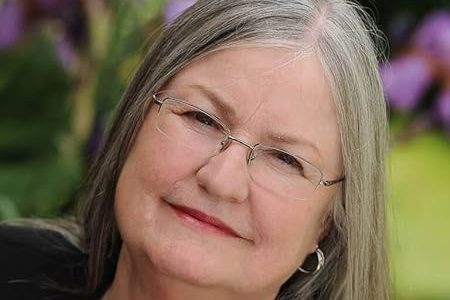
 I have the wonderful privilege of having wise and dear friends. When we can be together, we talk about the things that cause us trouble and what we are doing to ease the way. The issues the mothers we work with come up. I make notes and I share our thoughts with you. Sometimes the thoughts get buried in life for a time and then reemerge.
I have the wonderful privilege of having wise and dear friends. When we can be together, we talk about the things that cause us trouble and what we are doing to ease the way. The issues the mothers we work with come up. I make notes and I share our thoughts with you. Sometimes the thoughts get buried in life for a time and then reemerge.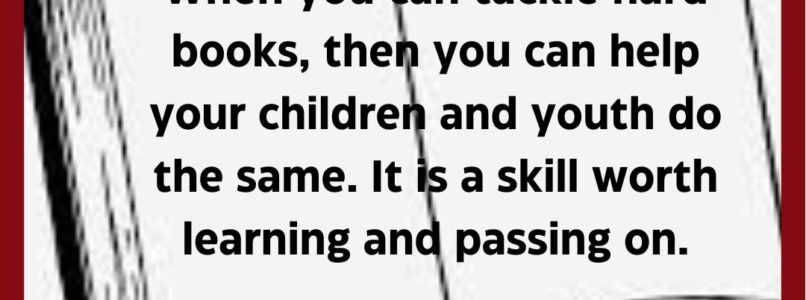
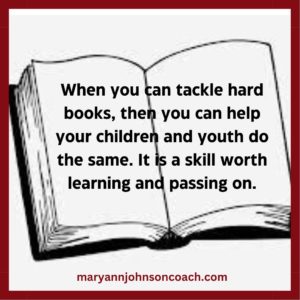 Have you ever wondered how to read books that aren’t easy reads? This has been an issue for me. I LOVE reading but sometimes the classics are a challenge. History can be dry. Some books deal with tough topics. How do you manage those?
Have you ever wondered how to read books that aren’t easy reads? This has been an issue for me. I LOVE reading but sometimes the classics are a challenge. History can be dry. Some books deal with tough topics. How do you manage those?
 I have a friend that I admire very much, Alysia Humphries. What got me thinking about her this last couple of weeks was that tonight (Saturday) I am going to a special event for caregivers. She and a handful of other women are giving some nurturing to caregivers. I fit into that group and so Alysia asked me to come. I am going to have some foot zoning done and Alysia is giving me some light therapy. Restful!
I have a friend that I admire very much, Alysia Humphries. What got me thinking about her this last couple of weeks was that tonight (Saturday) I am going to a special event for caregivers. She and a handful of other women are giving some nurturing to caregivers. I fit into that group and so Alysia asked me to come. I am going to have some foot zoning done and Alysia is giving me some light therapy. Restful!


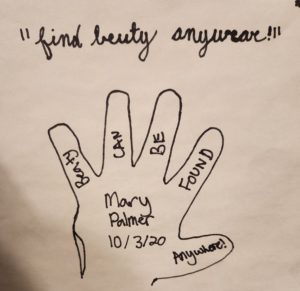 Last week, I shared my daughter’s journey from a traumatic brain injury to a life of love and service. I shared one of the secrets to her success – she had taken charge of what she focused on.
Last week, I shared my daughter’s journey from a traumatic brain injury to a life of love and service. I shared one of the secrets to her success – she had taken charge of what she focused on. came in a dream, and I held them in my heart for years. Eventually, I found a friend and distant relative who painted the dream. It reminds me of what I’m here to do. “Mission Statement – The Savior is healing me. I release old wounds and baggage. As I heal, I am healing generations. I feel satisfied bringing light to others.” Mary Ann Johnson
came in a dream, and I held them in my heart for years. Eventually, I found a friend and distant relative who painted the dream. It reminds me of what I’m here to do. “Mission Statement – The Savior is healing me. I release old wounds and baggage. As I heal, I am healing generations. I feel satisfied bringing light to others.” Mary Ann Johnson 17. I took a wonderful class on money stories from
17. I took a wonderful class on money stories from
 In 2003, my world turned upside down when my daughter, Jenny, was hit head-on by a drunk driver going the wrong way on a California freeway. Five years later, I wrote an article about Jenny’s journey and how she turned a major head injury into a life worth living. Another eleven years have passed, and I have watched my daughter live these words – You are what you think about and focus on.
In 2003, my world turned upside down when my daughter, Jenny, was hit head-on by a drunk driver going the wrong way on a California freeway. Five years later, I wrote an article about Jenny’s journey and how she turned a major head injury into a life worth living. Another eleven years have passed, and I have watched my daughter live these words – You are what you think about and focus on.
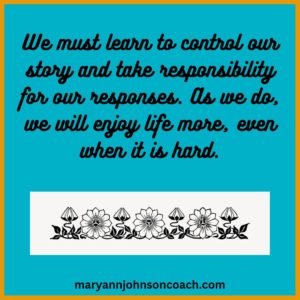 Today, although there are things I could share that would be less time-consuming to write and less emotionally draining, I am telling you about my morning. I am sharing this experience for a reason. After several decades of working on two principles, they can still trip me up. They are also stumbling blocks for many moms I talk with. I have written about them often, and I don’t want to beat a dead horse, but this is pivotal for our happiness and our ability to parent and relationship well.
Today, although there are things I could share that would be less time-consuming to write and less emotionally draining, I am telling you about my morning. I am sharing this experience for a reason. After several decades of working on two principles, they can still trip me up. They are also stumbling blocks for many moms I talk with. I have written about them often, and I don’t want to beat a dead horse, but this is pivotal for our happiness and our ability to parent and relationship well.
 I walk daily. Walking is the only exercise I get because, as I understand it, you can’t count housework. LOL I walk five blocks. A while back I decided to run those five blocks. I have never liked running, but in February of this year, I decided to run. The goal I set was to run the full five blocks by September. In the article I wrote sharing
I walk daily. Walking is the only exercise I get because, as I understand it, you can’t count housework. LOL I walk five blocks. A while back I decided to run those five blocks. I have never liked running, but in February of this year, I decided to run. The goal I set was to run the full five blocks by September. In the article I wrote sharing